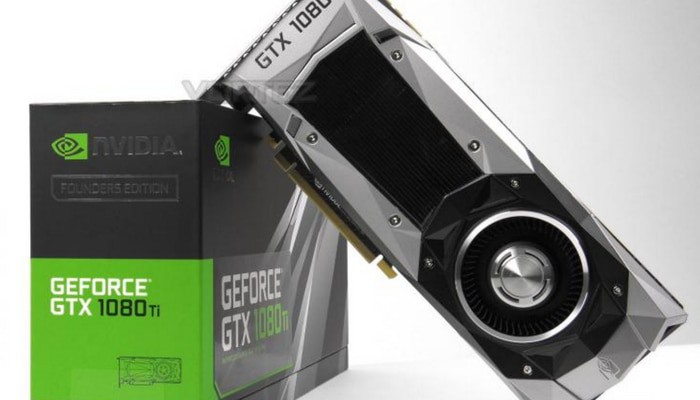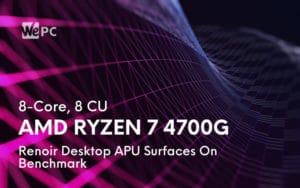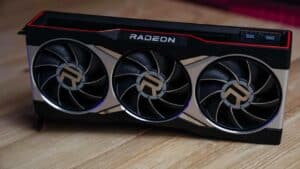APU vs CPU vs GPU. Which One Is Best For Gaming?
Ever wondered what the advantages of one was over the other - let's find out.
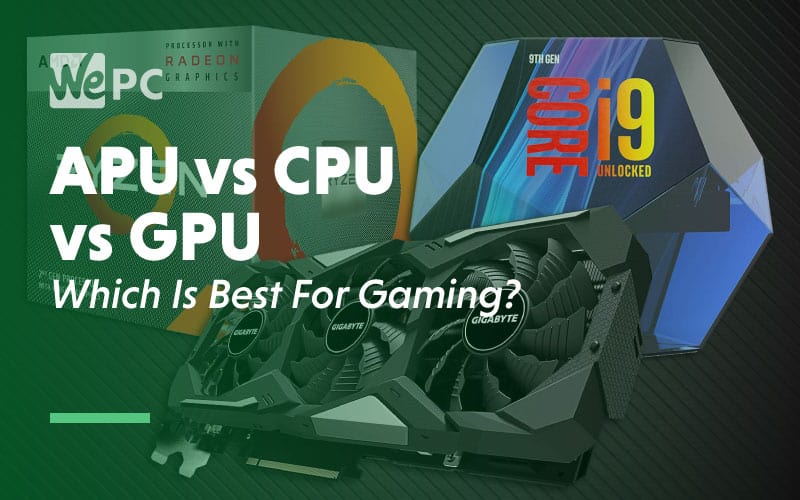
WePC is reader-supported. When you buy through links on our site, we may earn an affiliate commission. Prices subject to change. Learn more
APU vs. CPU, what should you get for your next PC build? In this article, we are going to go over the key differences between APUs, CPUs, and GPUs to aid you in your decision, ensuring you get the best build for your money!
Whether you are looking into a new office PC or a brand new gaming rig, the processor you go for can have a significant impact on your day to day performance. So should you rely on the APU/CPU integrated graphics or go for a fully dedicated graphics card? Well, we hope to make sense of this today.
What Is A CPU?
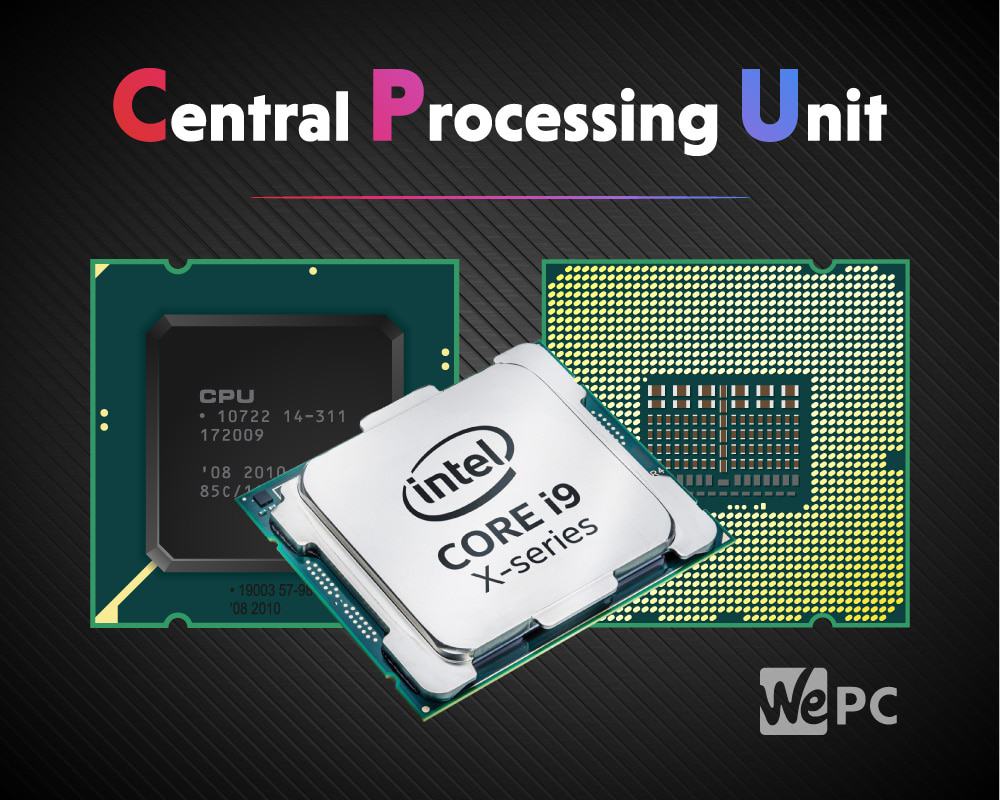
The CPU, otherwise known as the processor or central processing unit, is the most important component of any PC. The CPU essentially receives all the data being input and directs it where to go. Computer software sends instructions that need to be processed, and the CPU executes these instructions.
A processor with higher core and thread counts will allow the CPU to receive more tasks at once, resulting in greater productivity. A CPU will also feature a certain clock speed, the faster the speed, the faster those processing tasks are completed.
Both of these increase how much data a CPU can handle, which results in a smoother user experience overall.
What Is A GPU?
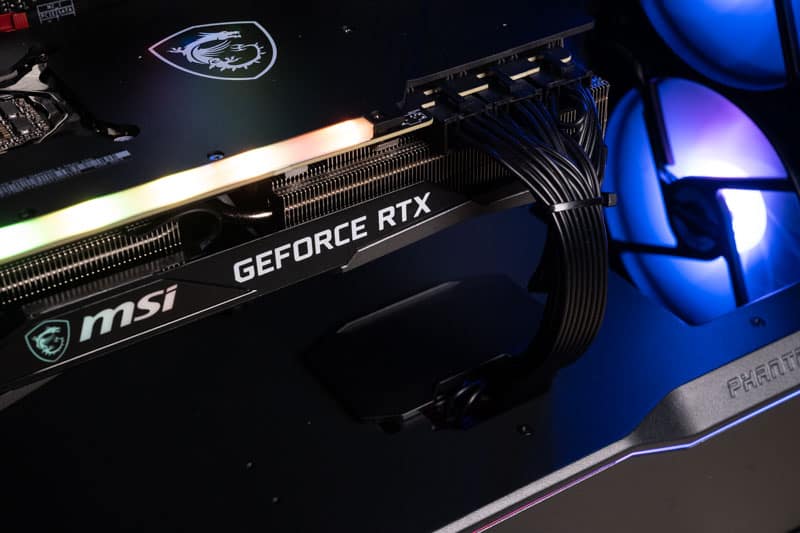
A graphics card or video card, commonly referred to as a GPU, is usually one of the main components for gaming-based computers. The faster your video card can process information, the more frames you will get every second.
Since games are visually demanding, they require a more powerful graphics card than your standard office PC.
Video cards are often the most expensive part of your gaming build and can be a tricky mountain to tackle when on a strict budget. There are cheap video card options, but they don’t always offer good gaming performance.
What Is An APU?
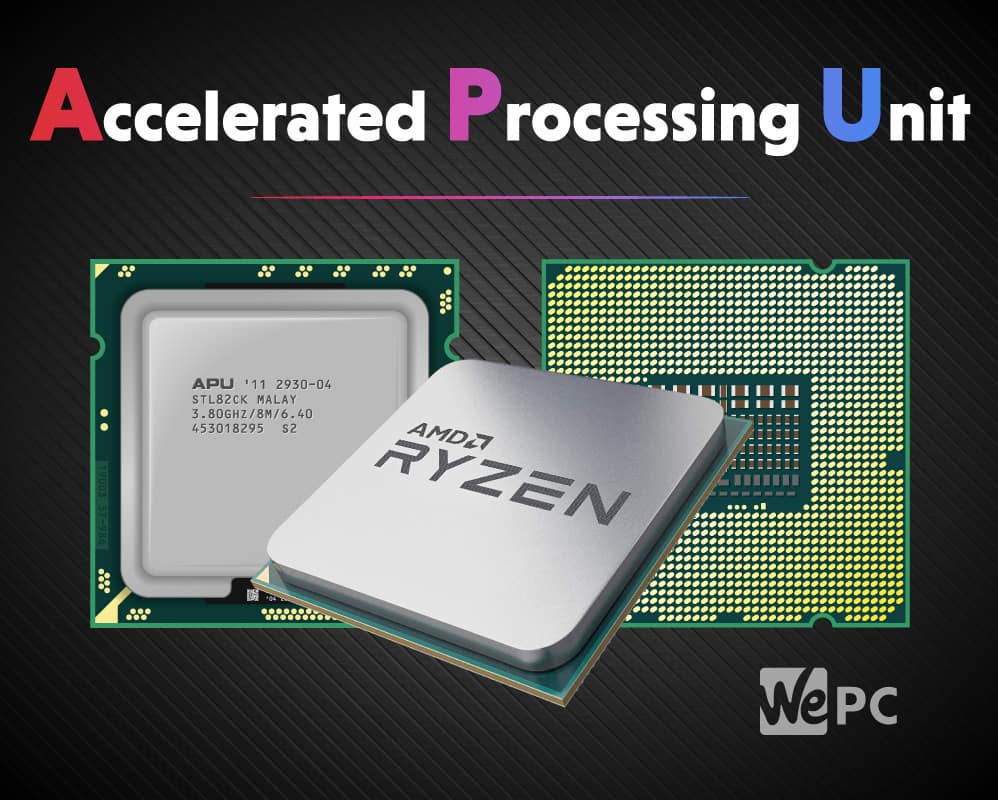
An APU (accelerated processing unit) is just another CPU from AMD, except it features integrated graphics onboard. Some people can get confused around this as most Intel CPUs come with integrated graphics. However, only AMD APU chips come with integrated graphics.
Simply put, the APU is the best of both worlds, offering the combination of both a CPU and GPU into one component. AMD was able to use its GPU architecture to create a better graphical experience than Intel with integrated chips.
What Is Integrated Graphics?
As mentioned above, most Intel CPUs feature integrated graphics, as do all AMD APUs. Both versions of integrated graphics work in a similar fashion, however, AMD’s Vega graphics can deliver a much better gaming experience. So APU vs CPU for gaming? APU takes this victory with ease.
While integrated graphics (iGPU) can enable gamers to play on a tight budget, the graphical power is far away from the performance levels of even some entry-level dedicated GPUs. So if you enjoy graphically demanding games or like to play in high settings, then you are most likely going to need a graphics card.
What Does An APU Offer?
In 2019, AMD hit the market with its successful lineup of 3rd-gen Ryzen processors. Offering great core and thread counts at affordable prices, they quickly became popular amongst gamers.
AMD also released the updated APU based on Ryzen with scaled-down Vega graphics. This was a great addition to their Vega graphic platform, as they are significantly stronger and more powerful than the first Radeon graphics generation.
There are two models in the current Ryzen APU lineup, although more will be released as the line continues to grow and expand. Your two options are the Ryzen 3 3200G with Vega 8 graphics and the Ryzen 5 3400G with Vega 11 graphics.
Ryzen 3 3200G vs Ryzen 5 3400G
| Ryzen APU | Core/Thread Count | Base Speed | Boost Speed | TDP | Socket | Graphics |
|---|---|---|---|---|---|---|
| Ryzen 3 3200G | 4-8 | 3.6Ghz | 4.0Ghz | 65W | AM4 | Vega 8 |
| Ryzen 5 3400G | 4-8 | 3.7Ghz | 4.2Ghz | 65W | AM4 | Vega 11 |
APU Without A Dedicated Graphics Card
As mentioned, the APU is perfect for the price-conscious gamer looking for their next low budget build. Both AMD’s current models feature quad-core processing with multi-threading, giving some excellent performance across the board for, well, less.
While this cost-cutting solution can give you more money to spend elsewhere, you will be sacrificing graphical performance as the power of these is rather limited.
Like all AMD’s processers, they benefit from dual-channel, fast-acting memory, so buy accordingly if going down this route.
CPU With Dedicated Graphics Card
A CPU paired with a dedicated GPU will always bring the best gaming performance. However, this will increase the overall cost of the build.
Both components are equally important for gaming and bringing that balance to your PC in general. While many consider the CPU to be the most important aspect of a PC, you cant enjoy the majority of games without a dedicated graphics card. A GPU has a separate chip, its own power budget, its own cooling, and its own memory, simply giving you more power to play with.
Whether you buy a dedicated GPU or not is linked to your budget, as this will often incur the most cost.
How Easy Is It To Upgrade?
Everyone wants longevity out of their equipment, but upgrades are inevitable. If you’re going with a traditional processor and graphics card setup, this can be an expensive process.
Upgrading your video card is usually pretty straightforward, as compatibility factors don’t change very often. When upgrading to a dedicated graphics card in an APU system, the integrated graphics will be disabled, giving you a dedicated processor.
Before the release of Ryzen, upgrading your APU system was a pain. The sockets on the motherboard didn’t match with that of the AMD gaming line of processors, and if you wished to upgrade, then it had to be specifically paired with a matching Radeon GPU.
This meant that if you wanted to upgrade to anything newer, then everything had to be swapped out. The resulting, steep price made APU’s a bad business decision.
This all changed, though, when they released Ryzen and gave us a better CPU platform. Upgrading became an easier and less expensive task, with all Ryzen CPUs and APUs using the same socket.
At the same time, AMD introduced backward and forwards compatibility within the Ryzen family. All Ryzen based CPUs are and will be an AM4 socket, and all past, current, and future chipsets will be compatible.
Adding a graphics card down the road is as easy as pairing with a CPU now because that’s basically what it is. The Ryzen based APU will work with any graphics card, allowing much more flexibility in deciding how you want to upgrade later.
FAQs
Is APU better than CPU and GPU?
Being that APU stands for Advanced Processing Unit, you’d be forgiven for thinking they had some sort of performative edge over the discrete CPU & GPU setup, but that’s not the case.
APUs are a fantastic way to kill two birds with one stone, which is particularly handy for new starters on a budget, but they’ll never compete with dedicated processing and graphics units. They just don’t have as much muscle in either department.
For typical computing, an APU is all you’d ever need. But when it comes to applications that impart a burden on both the CPU and GPU, such as gaming or 3D animation, two will always be better than one.
A dedicated GPU has its own cores, a customized thermal solution, and even an integrated memory, enabling higher resolution gaming, while simultaneously taking the pressure off your CPU.
The only issue is that discrete hardware costs a pretty penny.
What is the most powerful APU?
We’d be remiss if we didn’t preface this answer by mentioning that AMD has released plenty of amazing APUs that are leagues above Intel’s hybrid CPUs, but the AMD Ryzen 5 3400G is the best, without a doubt.
While we’re the first to admit that APUs aren’t particularly a gamer’s dream, loaded with superfast Radeon RX Vega 11 graphics, the Ryzen 5 3400G has what it takes to play most AAA games without a hitch.
It’s a quad-core APU with multithreading, meaning it has 8 threads in total, which is considered the sweet spot for photo editing software such as Adobe photoshop.
Perhaps best of all, in true APU fashion, it offers you amazing bang for your buck.
If that’s piqued your interest, why not check out our article about The Best AMD Ryzen APUs For Gaming In 2021 for more information about the Ryzen 5 3400G and plenty of other options too.
Will APU replace GPU?
As we’ve already discussed, in terms of performance, an APU will never truly fill the hole left by a discrete graphics card, but literally speaking, yes, an APU can replace your GPU.
APUs feature integrated graphics utilities on their processor chip, allowing you to save some pennies on your entry-level builds, and keep things simple while you learn how PC hardware works in a gaming context. Picking an APU can also help you save some space in your case, ensuring a seek-looking build.
If your query has more to do with the future of hardware and whether discrete GPUs will be made redundant by APUs, the answer is likely, no.
There’s no doubt that AMD will continue streamlining their APU technology, but they’ll always be able to pack more punch into their dedicated CPU and GPU units.
As we gamers tend to go where the power goes, there’ll always be a place in the market for stand-alone GPUs.
Can an APU work with a GPU?
Yes, you can absolutely use an APU and a discrete GPU in the same build. In fact, GPU compatibility is one of the biggest selling points of APUs.
You can save a small fortune by starting with an APU, which will hold you over until you’re ready to invest more in your computer hardware.
When that day comes, you can simply treat yourself to a stand-alone graphics card and combine it with your APU to optimize your gaming experience.
In most cases, you can expect the introduction of a discrete GPU to your case ecosystem to automatically disable the integrated graphics facilities of your APU.
It’s not that your integrated and discrete GPU can’t work together as a team, it’s that it wouldn’t actually increase your FPS, but lower it. Everything your dedicated GPU delegates to the integrated GPU will be handled at a much slower speed, offsetting any performance gains you’d expect to see by splitting the workload.
APU Vs. CPU And GPU: Who Wins?
As mentioned, this is mostly down to your budget and gaming needs. An APU will never compete with a CPU/ GPU setup, but that doesn’t mean its a waste of time or money. Going down the budget route with an APU means you could upgrade your system to feature a dedicated graphics card at a later date. On the other hand, you could save more and splash out on a dedicated GPU, giving you a boost in graphical power right out of the gate.
For the majority of users, I am always going to suggest going for a CPU and GPU pairing as it’s going to provide you with a much better experience and won’t leave you needing an upgrade quite as fast.
At the end of the day, APUs are never going to be ideal for gamers. However, they offer a solid entry-level way into PC gaming, giving you time to save up!

